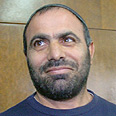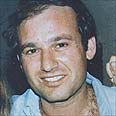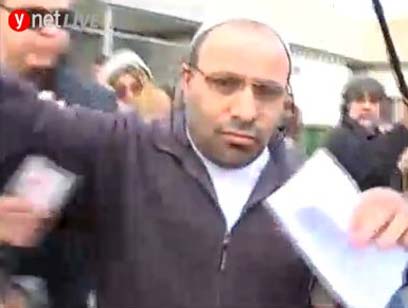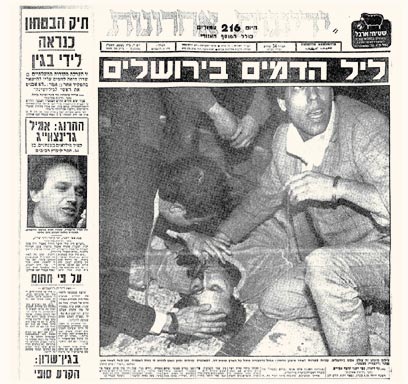

The man who murdered Peace Now activist Emil Grunzweig at a 1983 Jerusalem protest, Yona Avrushmi, was released from prison Wednesday.
He left the Rimonin Prison in the Sharon region at around 11:30 am. He refused to talk to reporters, and even tried to slap the cameramen and forcibly remove their cameras. Asked whether he had something to say to Emil Grunzweig's family, he just bit his lips. He was not met by anyone outside the prison.

Leaving prison (Photo: Oz Maron)
Avrushmi was handed a life sentence in 1985 for throwing a grenade during the rally, and in 1995 his sentence was mitigated to 27 years. All of his subsequent appeals were denied.
According to Avrushmi's aides, upon his release he would move into an apartment in southern Tel Aviv. "This person is an energetic working man, and it seems that he'll find work faster and start working and rehabilitating his life," one of them said.
Grunzweig's family said ahead of Avruishmi's release that they "hope the man will strive only for self-rehabilitation and not incitement to murder".
Avrushmi has been in prison since age 27. Two years ago he appealed for an early release, making the claim, among others, that if convicted terrorist Samir Kuntar was released he should be, too.

Yedioth Ahronoth headline day after murder
The committee deciding his case rejected the appeal, stating that his opinions had not become more moderate. Two previous appeals were accepted but later rejected after the intervention of the state. The Grunzweig family has also protested his release.
Avrushmi's conditions were also made more severe recently after the Prison Service deemed his behavior inappropriate and he was transferred to a different penitentiary.
But in 2010 Avrushmi began a rehabilitation program that allowed him far better conditions, including the possibility of holding a job outside prison grounds.
'Emil wanted change through education'
Tzila Ushpiz, one of Grunzweig's closest friends, recalled the day of the protest, which she was scheduled to attend together with him. "He was very optimistic," she recounted. "He thought the protest would succeed in changing something."
Ushpiz met Grunzweig in Kibbutz Revivim, where they served in the Nachal together. "I'll never forget the turmoil in Israel after the slaughter in Sabra and Shatila," she said. "Emil believed change would come through education, so he worked with Jewish and Druze youth to try and close the gaps."
But Ushpiz is still undecided on the matter of Avrushmi's release. "I don't know what he's claiming today – whether he says he did it or not, whether he's sorry. I think that for the first time I don't care, the pain about Emil is too great to think about his murderer."
Shlomit Cna'an, another good friend of Grunzweig's and his colleague at the Van-Leer Institute in Jerusalem, told Ynet she had been with him at the protest but had to leave early. "This was a man I loved very much – the beautiful Israeli who was murdered for what he believed in, in an atmosphere of incitement," she said.
On February 10 Grunzweig's friends plan to hold a ceremony in his memory. "We are still living those days, in thoughts of him and Israel as a whole. He wasn't just murdered, it was because he had the ability to protest a situation we had been living in for 28 years," Cna'an said.
Like Ushpiz, she cares little about Avrushmi's release. "This is about something systematic, a general atmosphere," she said. "I don't feel hurt or angry, but rather distress at the situation and the atmosphere here. The murderer is just a small part of a whole problematic system."
Aviel Magnezi contributed to this report
- Follow Ynetnews on Facebook















